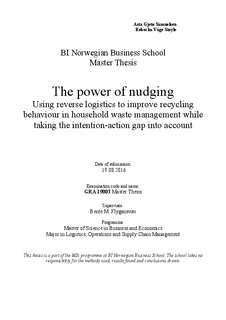| dc.description.abstract | Reverse logistics plays an important role in keeping resources in the supply chain
for as long as possible through the creation of a circular waste management
system. In household waste management, the success of such a system depends on
the end-consumer, which supplies waste to the reverse supply chain. The aim of
this thesis is therefore to examine how reverse logistics may contribute to improve
the end-consumer-turned-supplier’s recycling behaviour, while taking the
intention-action gap into account.
A conceptual framework of recycling behaviour has been developed and tested
empirically using a two-group dependent post-test quasi-experimental design
following ethical guidelines. Data was collected through a pick-analysis and
questionnaire. The empirical setting is a source-separation system, and the
experimental and control groups were chosen from a high-rise housing
cooperative in an urban residential district in Oslo municipality. Three
interventions, or nudges, are designed to change behaviour through either the
supplier or system dimensions. 1) Informational nudge to improve motivation
through activation of social norms. 2) System nudge through reduced distance. 3)
System nudge through access to equipment. The latter two aim to improve
convenience. Results show improved recycling behaviour for the experimental
group. 17% more food waste recycled, 29% less glass and metal disposed of in
residual waste, and less contamination within recycled fractions. Control group
behaviour stayed constant. Intentions to recycle are similar between the two groups. In conclusion, targeting the end-consumer-turned-supplier through either system
or supplier characteristics may improve recycling behaviour and recycling rates.
This has both theoretical and practical implications for waste management system
design, as this thesis contributes with an increased understanding of the role of the
end-consumer-turned-supplier and how any intervention can help improve actual
recycling behaviour.
Key words: reverse logistics; recycling behaviour; nudging; household waste;
circular economy | nb_NO |
